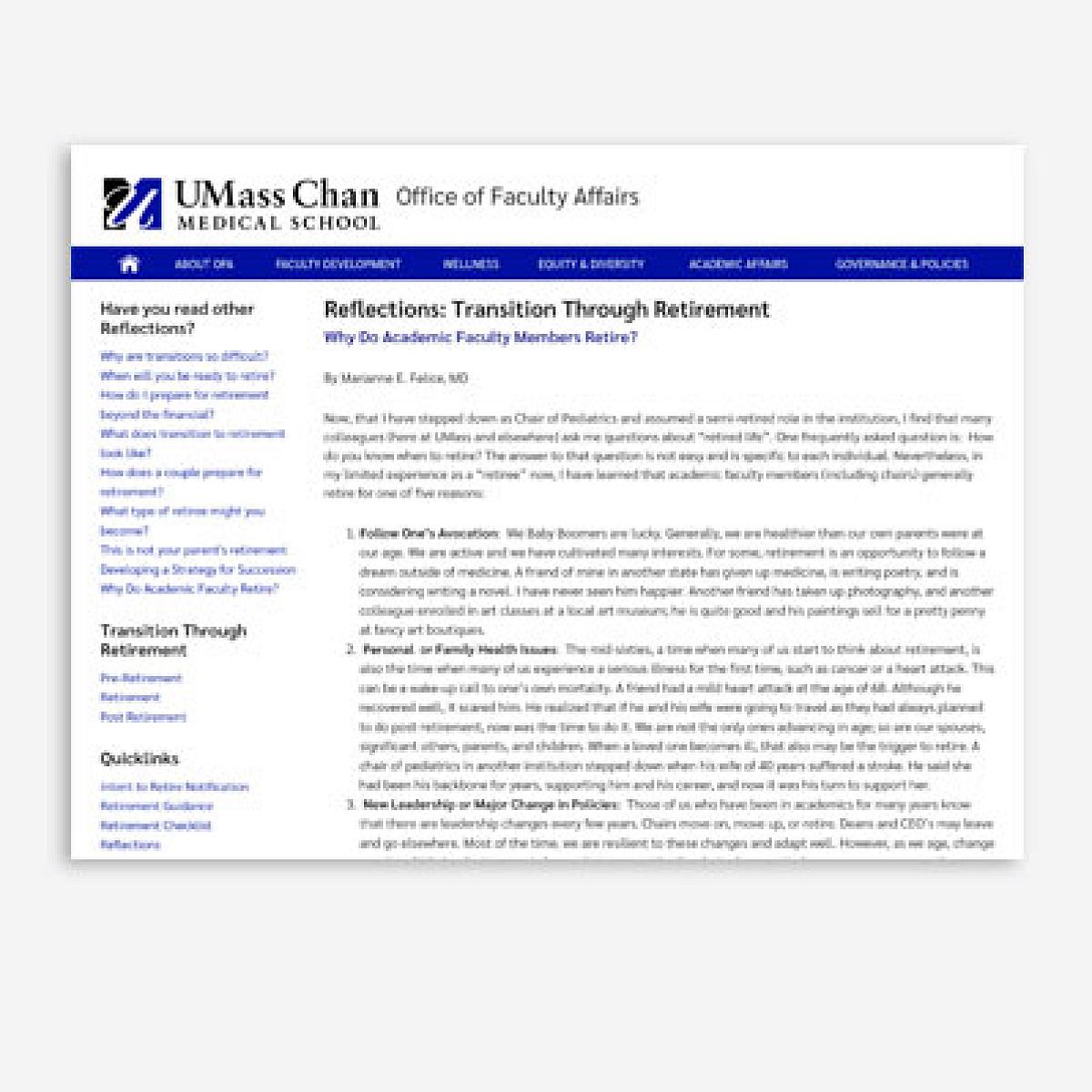
Transitioning Through Retirement

Transitioning Through Retirement
On this page
- University Retirement Policies
- Frequently Asked Questions (FAQ)
- Transitioning through Retirement Council
- Recommended Reading
Contemplate
- How do you wish to spend the remaining time in academics?
- What legacy do you want to leave behind?
- What do you want to accomplish before you retire?
Reflect on your career so far
- What important career goals remain to be accomplished?
- What projects are my highest priority?
- How can I use my remaining years in service to my students, institution, and profession?
- How do I phase out of my duties in a way that best supports my colleagues and students?
Reach out to colleagues
- Stay engaged, up to date, and productive.
Seek assistance and support from Division Chief and Department Chair
- Align career goals with institutional needs
Take charge of the final years of your professional life
- Value the autonomy that is a hallmark of academic life and take full advantage of it
- Decide what you want to accomplish before you leave academics
- Define clear goals
- Determine how you will divide your work time
Develop a comprehensive plan for retirement
- Prepare for the social, professional, and personal dimensions of retirement.
- Consider what will give you meaning and purpose in your retirement years.
- How will you stay intellectually engaged?
- How will you stay connected to your institution, department, and profession?
GET TO KNOW YOUR UNIVERSITY RETIREMENT POLICIES
Policy 5-112: Retirement and Retiree Benefits
Highlights of this policy
- University Employees shall not be required to retire solely because of age
- Either full or partial retirement on an optional basis may be arranged, with administrative approval, prior to or after the normal retirement age.
- The “normal” retirement age for University Employees is 65 years
- The University’s administration may employ from year to year, or for lesser period, for part or full-time, any Faculty Members who have fully retired but whose services are needed by the University
- Appointments to emeritus status for retired Faculty Members are made by the Board of Trustees on recommendation of the president and vice president for academic affairs
- Procedures
-
- Notify the Department of Pediatrics Administration at least 90 days before a proposed retirement date. They will then notify the Benefits Office who will initiate retirement plan benefit payments and other arrangements relating to retired status.
- Can schedule individual counseling through the Benefits Office to answer questions regarding retirement, social security, Medicare, and continuation or conversion of insurance coverage
Benefits for Retired Employees – These all keep you connected to the University.
- Faculty and Staff who, on or after their 60th birthday, commence full retirement after completing five years of continuous service for the University immediately prior to retirement will be entitled to the following benefits (for additional benefits for emeriti and their spouses, see paragraph 2, below):
- Retiree I.D. card with a lifetime validation free of charge.
- Bookstore discount.
- Use of physical education facilities.
- Use of those Union Building facilities requiring I.D. cards, such as movies, bowling, billiards, lectures, etc.
- Discounts on athletic and theater season tickets and travel series tickets. Also, discounts for concerts in the Special Events Center.
- Parking with purchase of appropriate sticker.
- Borrowing privileges at University library facilities.
- Reduced tuition of 50% on classes taken for credit to four hours per semester.
- Continued membership in the University credit union.
- Fully retired Employees holding appointments as emeriti, and their spouses, are entitled to the following benefits:
- Emeritus I.D. card entitling the holder to (1) all privileges regularly available to holders of faculty I.D. cards, (2) discounts on purchases at the University bookstore and University of Utah Press, (3) reduced prices for season tickets to athletic events and Pioneer Memorial Theater programs, (4) Faculty privileges relating to participation in the campus recreation program, (5) golfing privileges on the University golf course on a reduced fee or limited complimentary basis, and (6) complimentary admissions to the Museum of Natural History.
- Membership without charge in the University of Utah Faculty Club. Faculty Club (utah.edu)
- Enrollment in University classes without payment of tuition or fees, except as provided in Policy 5-305.
- Campus parking privileges without charge.
- Admission without charge to dress rehearsals of Pioneer Memorial Theater main stage productions.
- Reduced price tickets, not to exceed two per game, for individual football and basketball home games, subject to availability of unsold seats.
- Complimentary tickets, not to exceed two per event, to University Travel Club programs, and discounted admissions to other programs presented by the Lectures and Concerts Office of the Academic Outreach and Continuing Education.
- Listing in the University general catalog and the University directory, and receipt of monthly publications of the University Office of Public Relations.
- Eligibility to apply for and receive Faculty research grants from the University Research Committee.
- Invitation to attend annual Faculty breakfast preceding autumn semester.
- Use of office and laboratory facilities, but only to the extent such facilities can be made available by the cognizant department chairperson or dean within the limits of approved space allocations to the department or college.
Policy 5-309: Phased Retirement Program
This program is a great benefit! It allows faculty to reduce the number of hours actually worked, while retaining eligibility for University benefits as a full-time employee.
- Provides Faculty an opportunity to devote increased time to personal interests by partially retiring, or retiring in planned stages, while continuing to provide service to the University in their area of greatest expertise
- Must be at least 55 years of age and completed 5 years of continuous service to the University
- Not an entitlement or a right automatically available
-
- Subject to administrative approval
- Faculty member must agree to a reduced FTE that cannot be increased, but can be decreased.
-
- Must reduce FTE by at least one-fourth (that means if you are full-time, you must at least reduce to .75 FTE)
- Faculty member will be entitled, for the duration of the agreement, to the same status and employment related benefits as attained prior to the effective date of the agreement
- Entitled to financial incentive payments to compensate for the reduced retirement contributions resulting from a reduction in the FTE assignment
-
- Difference between what the University contributes to the participant’s retirement fund before and after the phased retirement takes effect.
- One-year trial option
- Written request to Department Chair at least 6 months in advance
- Meet with Human Resources Benefits Department to learn about retirement income options
- Phased Retirement Summary
The faculty member will be entitled to the same status and employment-related benefits, including vacation, holiday, and leave benefits to the same extent as other faculty members holding like positions at the same percentage of full-time effort
Policy 5-306: Early Retirement Incentive Program
This program involves an arrangement for Retirement before Social Security Full Retirement Age with incentives as provided in a written contract between the University and the retiree, consistent with the provisions of this policy. Use the link above to get the details.
FREQUENTLY ASKED QUESTIONS
Am I eligible to retire?
- Review the University of Utah policy Eligibility for Retirement from the University
Who can I talk to that has been through or is going through this transition in the Department of Pediatrics?
Are there suggested readings when one is contemplating retirement
- You should discuss your plans with your Division Chief.
- The Department of Pediatrics recommends that you notify Department leadership of your plans to retire One Year before your planned retirement, especially if you currently hold a leadership position. This allows sufficient time to develop a clear transition plan and expectations for the retiring faculty member
- Notify the Director of Pediatric Faculty and Staff Administration (Nick Snow)
- Use the University of Utah Retirement Checklist to get an overview of the timeline
- You can schedule individual counseling through the Benefits Office (801/581-7447, option 1) to answer questions regarding retirement, social security, Medicare, and continuation or conversion of insurance coverage.
- This program involves an arrangement for Retirement before Social Security Full Retirement Age with incentives as provided in a written contract between the University and the retiree, consistent with the provisions of this policy. Get more ERIP details.
- The decision to move to part-time is made with your Division Chief, in collaboration with the Department Chair. There are a couple of ways to consider
- Simply reducing your FTE. This approach may be better when your date of retirement is uncertain.
- Phased retirement. The University offers this generous pathway to transition to full retirement, but you need to have a firm idea of your full retirement date
- It is recommended that you consider benefits when contemplating options.
- Yes
- A detailed list of full retirement benefits.
- Information Summary of Current Retiree Benefits
- Yes. You would add (retired) to your title, e.g. Professor of Pediatrics (retired). If you are awarded Emeritus status, then your title would be Professor Emeritus.
- This is an individual decision based on your post-retirement plans. You will need to maintain your license if you plan to continue some form of clinical work
- A listing of the generous EMERITUS benefits
The Emeriti Club has many services and activities available to its over 500 members. These include:
- A weekly hiking schedule.
- International and domestic group travel programs.
- Monthly luncheons during the academic year with well-known speakers addressing topics of interest to retired faculty.
- A newsletter listing the club activities, obituaries, addresses by the editor and president, and an update of issues relevant to Emeriti.
- Advocacy for the Emeriti faculty regarding relevant interest, such as health insurance.
How do I join the University’s Emeriti Club?
- Retirees are eligible for
- Access to Eccles Student Life Center and other University Use of physical fitness and recreation facilities, classes, and programs with payment of membership or course fees.
- Use of those Union Building facilities requiring a University ID card, such as movies, bowling, billiards, lectures, etc.
- Discounts on University athletic season tickets.
- Emeritus faculty are eligible for the above benefits AND
- Free admission to the Utah Museum of Fine Arts, Utah Museum of Natural History and Red Butte Garden.
- Reduced prices for season tickets to Pioneer Theatre Company programs and admission without charge to Thursday dress rehearsals of Pioneer Theatre Company productions.
- Tuition-free enrollment in University, Osher, and most Lifelong Learning classes (fees apply but there is no tuition charge). A “Tuition Reduction Form” must be filed and submitted to the University Human Resources department.
- All retirees retain borrowing privileges at University library facilities.
- Yes, as retired faculty you will maintain your UMail account.
- Retirees can access parking with the purchase of an appropriate pass.
- If you have Emeritus status, you can get free parking in campus “Visitor” lots**. Register your car license plate(s) – maximum of 2 – with Commuter Services. Provide your name, emeritus ID number and license plate number(s)
- Emeritus faculty are eligible to apply for research grants and to spend research funds on behalf of the University, subject to all approvals.
- Coverage will continue through the last day of the pay period in which you are separated from your employment (i.e., if your last day worked is July 1, your health care coverage will continue through July 15; or if your last day worked is July 31, your health care coverage will terminate on July 31.)
- Upon separation from the University, many of your employee benefits will stop including enrollments in accidental death and dismemberment, disability insurance, flexible spending accounts, group legal plan, health and dental coverage, home and auto insurance, and retirement plans. Helpful information regarding ending each of these benefits.
- Health care coverage at group rates is available through the University of University Retirees. Retirees pay the full cost of their health coverage. Retirees and their family members who are not yet eligible for Medicare may enroll in the University's Retiree Health Care Plan or find coverage at healthcare.gov.
Retirees and their enrolled family members may maintain dental coverage through the University for the first 18 months following retirement. At the end of the 18-month period or during a subsequent Open Enrollment Period, retirees may enroll in group dental coverage through Regence BlueCross BlueShield.
For additional information, visit Retire Benefits (Group Retiree Health Coverage section)
- If you or your family members are eligible for Medicare when you retire, you must enroll in both Medicare Parts A and B. You should begin the enrollment process at least two months before your retirement date. See Planning for Retirement for additional information on Medicare. If your retiree health coverage includes prescription drug coverage (most Medicare Advantage Plans include this), you don’t need to enroll in a Medicare Part D Plan. However, if you enroll in a plan that doesn’t include prescription drug coverage, you will need to enroll in a Part D Plan, as well.
- If you and/or your family members are not eligible for Medicare when you retire, you will need to enroll when you reach age 65.
- Retirees and their covered dependents who are eligible for Medicare must enroll in Medicare Parts A and B. The University's Retiree Health Care Plan pays benefits as a secondary health plan for those eligible for Medicare, whether or not the individual is actually enrolled in Medicare.
- Retirees and their family members who are eligible for Medicare may choose from the following options:
- Enroll in the University’s Retiree Health Care Plan by completing the Retiree Health Care Plan Enrollment Form
- Enroll in a Medicare Advantage plan through Regence BlueCross BlueShield, University of Utah Health Plans, or UnitedHealthcare
- Enroll in a Medicare Supplement plan through Regence BlueCross BlueShield or UnitedHealthcare
- Enroll in other individual coverage
- For information on the University’s plans, as well as monthly premium rates, see the following:
- Medicare Part D Prescription Drug Coverage is available through the University with Regence Life & Health ("RLH") Medicare Script™ for those eligible for Medicare. It is available to Retirees enrolled in the University’s Retiree Health Care Plan and to those who choose other Medicare Supplement coverage.
- For detailed information on the Medicare Advantage and Medicare Supplement plan options being offered, contact the provider directly.
- Retirees and their enrolled dependents who become eligible for Medicare after enrolling in the Retiree Health Care Plan should contact the Benefits Department prior to the date they become eligible for Medicare in order to avoid a loss of prescription drug coverage and possible Medicare late enrollment penalties.
- No, vacation, sick, and personal preference accruals are not paid out upon retirement.
TRANSITIONING THROUGH RETIREMENT COUNCIL
Madolin Witte, MD
Former Critical Care faculty, retired in 2021
Was full-time up to retiring
Brad Poss, MD, MA, MMM
Former Critical Care faculty
Retired in 2020 before age 60
Lynne Kerr, MD, PhD
Former Pediatric Neurology faculty, retired in 2022
Participated in the Phased Retirement program
Roger Faix, MD
Former Neonatology faculty, retired in 2017
Still participates in teaching and research








